The history of gold is closely intertwined with the history of the development of mankind - the joint existence of more than one hundred years. At various times, this metal has been valued far above other materials. It has been used to make cult objects, decorations, money. We are used to the fact that the color of the noble metal is limited to two or three options. Few people know that there are others - blue, green, blue and even black. Let's talk more about what color gold is, what this or that shade depends on, and how to check the quality of the product.
Gold: history of origin, characteristics of the metal
No one can establish the exact date of discovery of gold as a precious metal. Bright products archaeologists find in caves, where their ancient owners lived more than 50 thousand years ago. The metal was most widespread in China, Ancient India and Ancient Egypt.
It is believed that this is where the solar metal was mined for the first time.
The ancient Egyptians were able to establish an organized extraction of the precious metal, and then change the currency - gold replaced barley grains in that position. The ancient state managed to accumulate almost 5,000 tons of the solar metal and then lost it due to wars. For about 10 centuries the mining of gold-containing ore was very modest.

Since the discovery of the Americas, interest in gold mining has increased, and as early as the 19th century it became an international occupation. The search for gold-bearing veins and accumulations by archaeologists led to the discovery of a number of new lands. Our country actively began mining and processing. 1948 - opening of the Institute (VNII-1), which is still engaged in the study of gold and other rare metals.
At the moment, the richest deposit is in South Africa (Africa) - the Witwatersrand. This gold province is simply a mineralogical paradise - there are about 40 gold mines. And each of them can be considered as a separate deposit. Here 30-50 % (up to 1,000 tons annually) of the world's volume are mined.
By comparison, Africa's second largest gold producer, Ghana, produces about 100 tons annually.
Yellow Metal Characteristics:
- malleability and ductility - easy to work with;
- low electrical resistance - used for the production of electronic devices;
- high inertness - resistant to the influence of other elements or compounds, even the most aggressive;
- when polished shows high reflectivity - gold plating is often used as protection against all kinds of radiation.
Interesting: in the periodic table of Mendeleev, the metal is named Aurum, and stands at number 79.
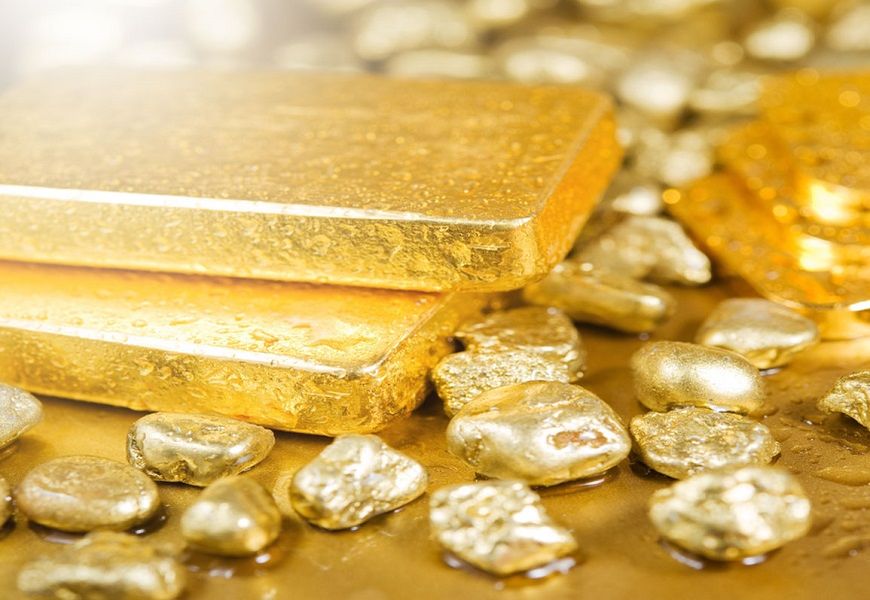
What does gold look like in nature: color and assay. What a ligature is for, its composition
We are used to imagining that gold lies deep in a mine or at the bottom of a river. It takes a lot of effort to get it. But microscopic doses of the precious metal are all around us. For example, there is it in corn, in seawater. That's where it's most abundant. But no method of extraction has been devised yet.
An interesting fact: it is believed that if you burn a ton of dry corn, the resulting mountain of ash will contain about 60 grams of the precious metal. The separation of Aurum from the ash will require significant costs, so this method of extraction is unprofitable.
It occurs in nature in the form of:
- ores;
- sand of a very fine fraction;
- nuggets.
Sand, a large nugget with impurities, or schlich particles (gold that has undergone primary washing) are all bright yellow in color with a strong luster. This is the standard: 999. It is the most expensive and has the minimum amount of impurities. But because of its physical properties, it is not used raw. Natural gold can be crumpled by hand like plasticine.
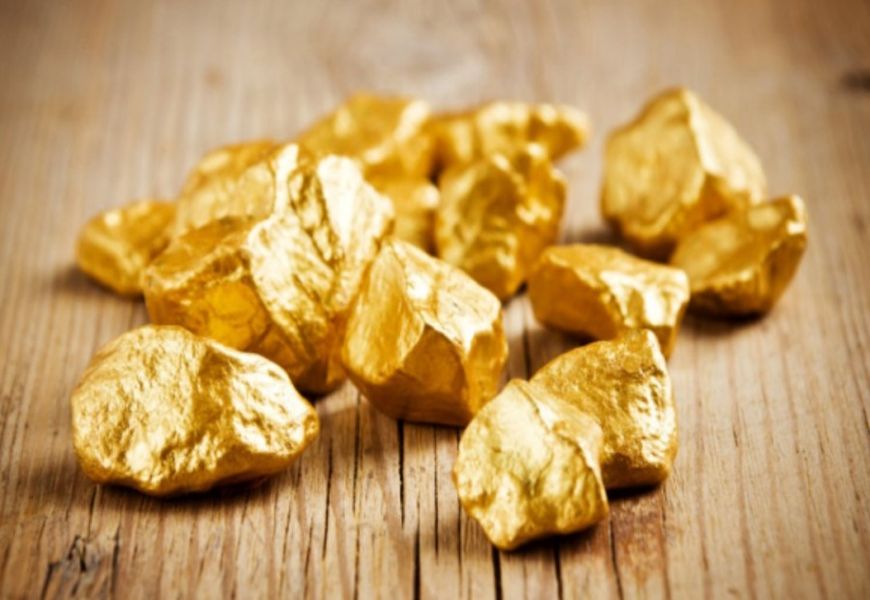
Interesting fact: You can get gold at home if you master electrolysis.
To add hardness and strength to the noble metal, the 999 sample is diluted with a ligature - a combination of other metals.
Palette and color classification of gold due to alloying components
Colored gold is a credit to ligatures. The most commonly used ligature consists of three metals: palladium, copper, and silver. Less familiar chemical elements can be used.
Red gold and its healing properties
Red is the most familiar shade to our eyes. Most people believe that it is the most expensive and highest quality metal. It is this shade that accounts for up to 60 % of sales. The ligature is copper. The greater its percentage, the richer the shade of the product. For example, you can buy products with an orange hue (it is often abbreviated in English as RGB).
For reference: 585 proof - the share of copper is 41.5 %.
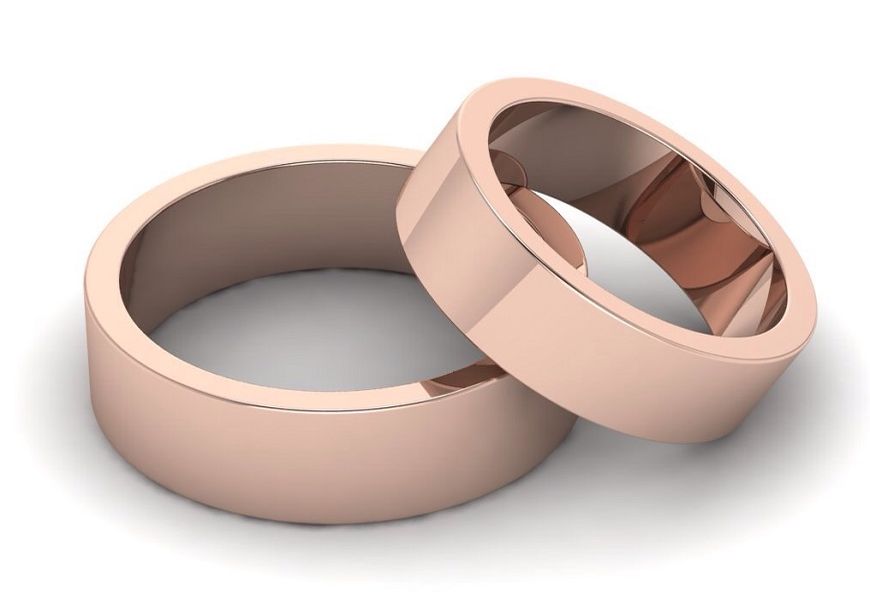
If you believe the beliefs, wearing a piece of red gold can have a therapeutic effect:
- increasing the oxygen saturation of the skin, accelerating regeneration processes;
- normalization of the thyroid gland;
- help for infertility, impotence;
- Acceleration of recovery in the presence of inflammatory processes.
Yellow gold for going out
You can get a lemon hue if you add copper, silver. The more in ligature The more silver it is, the lighter the color of the finished alloy will be. It is yellow gold that has caught on and is particularly beloved by fashionistas in Europe. Such jewelry is worn for solemn occasions - at the theater, in a restaurant, or as a guest.
The golden glitter of jewelry (also called shaini) is especially striking in the evening.
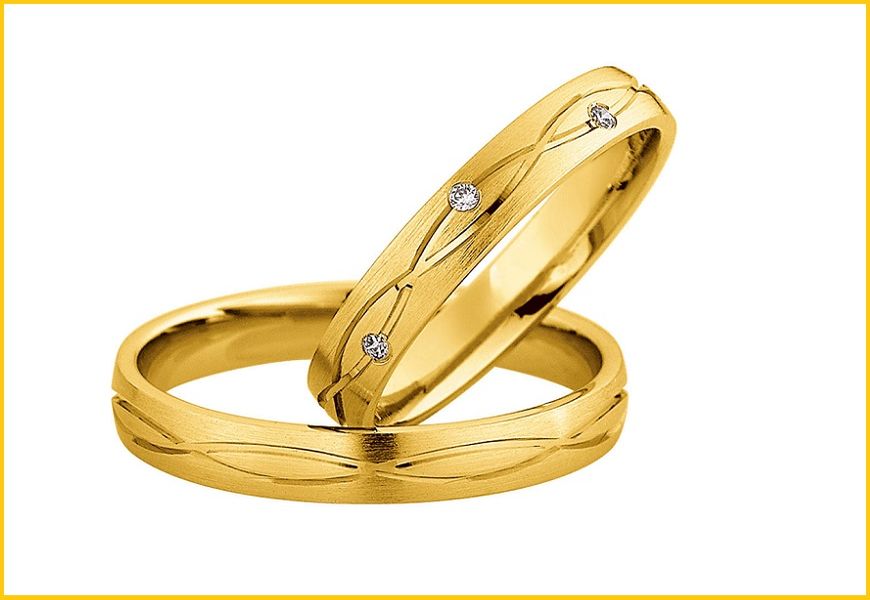
The purest and most expensive white gold alloy
To achieve the white color of the precious metal, silver, palladium or platinum are added. In our country, this unusual color is becoming more and more popular. Let's find out which alloy is the best:
- 375 proof - the lowest value. The ligature is nickel, zinc, silver. The product is oxidized and has a grayish tint;
- 585 hallmark - average price. The ligature is palladium. The protective coating is rhodium. This alloy is more expensive than the yellow one;
- 750 - the most expensive alloy. Ligature - 25 % Platinum. The 750th assay white gold looks noble, costs more than all other shades, but needs to be treated with care.
Engagement rings of a simple shape made of a similar alloy look expensive and stylish. When buying, it is better to ask for a document that can confirm the quality of the product.
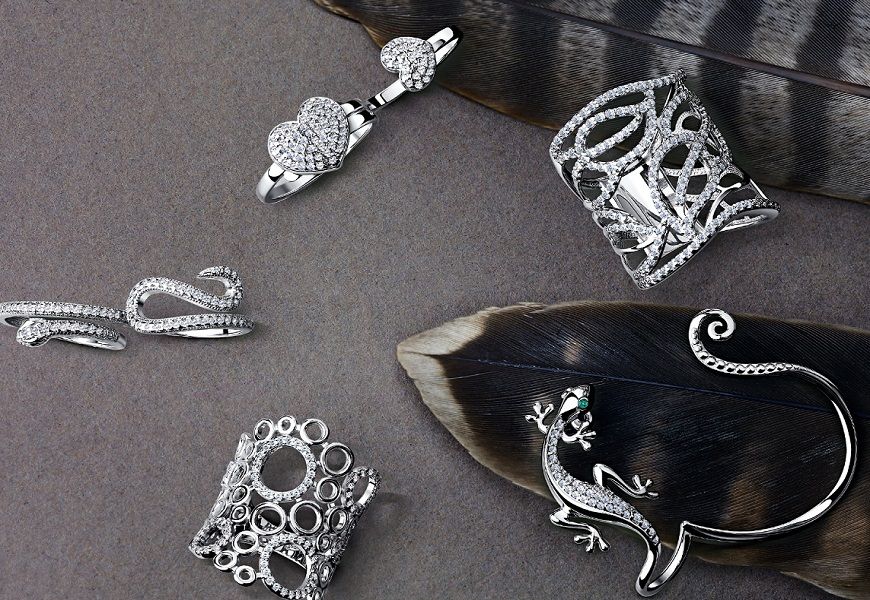
Important: Often, trying to reduce the price of the final product, manufacturers attract a cheaper resource - nickel. Unfortunately, this metal very often causes skin allergies. Moreover, nickel tends to accumulate, gradually poisoning the body. The reaction can manifest itself on any part of the body, not where the jewelry is worn.
Pink gold as a marriage for jewelers for years
Pink The precious metal was considered by jewelers to be a marriage for many years. It has been known for a long time, but only became fashionable by the 1990s. It happened thanks to the fashionable jewelry houses, which turned their attention to the unusual shade when they were looking for new trends.
The ligature is copper and silver. Here it is important to note that the resulting rose gold alloy is deformable because it is too soft. If you need your rose gold metal item repaired, contact only highly skilled craftsmen.
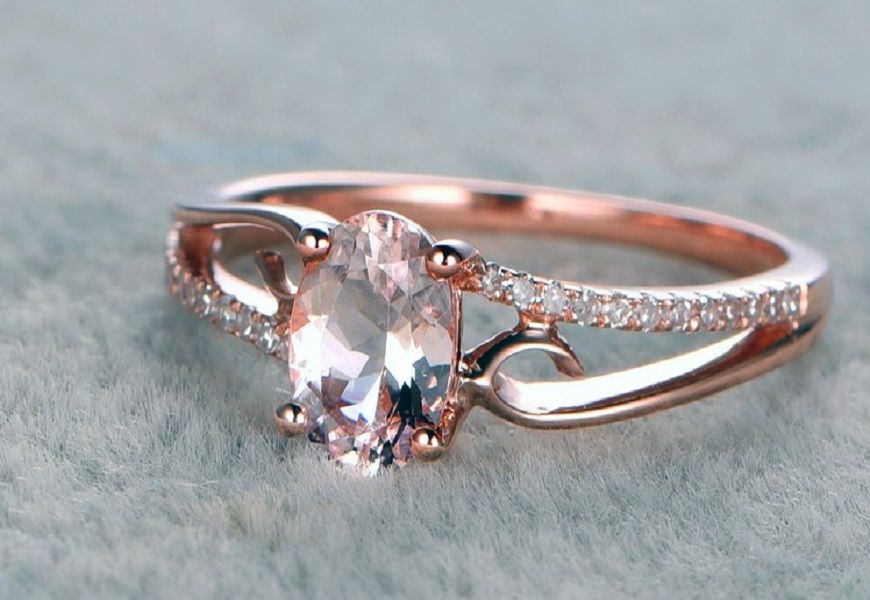
The ancient roots of green gold from the Mediterranean
Another name for such an unusual alloy is electrum. Native gold-bearing veins with a fraction of silver have been discovered in the Mediterranean. Electrum was used to make coins and furnishings for King Croesus, known for his wealth.
The unusual yellowish-green color of the sun's metal is given by silver, which has a high oxidation capacity. But the khaki or olive color can be obtained by adding potassium or zinc to the composition. When applied to the black gold (the thickness of the layer is one atom), the product begins to play with the bright colors of bottle glass.
Important: If the alloy has an amazing emerald hue, there is a possibility that the composition has been enriched with cadmium. In some countries, it is forbidden for this purpose because of its toxicity.
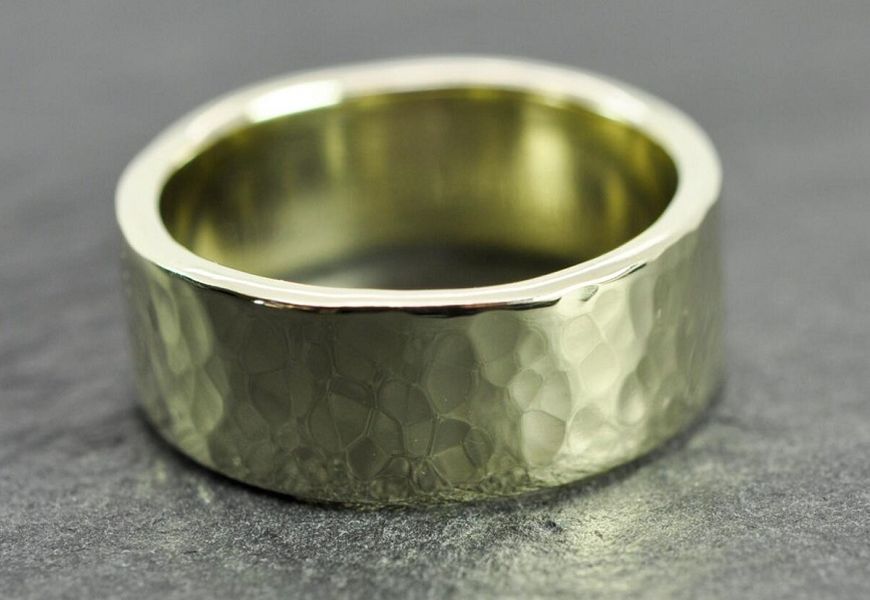
The fragile soul of blue gold
Cobalt, steel, and chrome are known to give a blue hue to gold. But not many jewelers know the right proportions. The recipe is classified. Blue-gold jewelry is the most expensive because it is exclusive and fragile. As a rule, items of blue alloy are not made in bulk, and are limited to small inlays. They can perform ornaments, paintings, ornaments. The unique composition quickly oxidizes in contact with skin, and then breaks down.
Interesting: the deciphered ancient recipe of the alchemists states that 9 parts of the "solar" metal and 3 parts of iron were used to make the brightly colored metal.
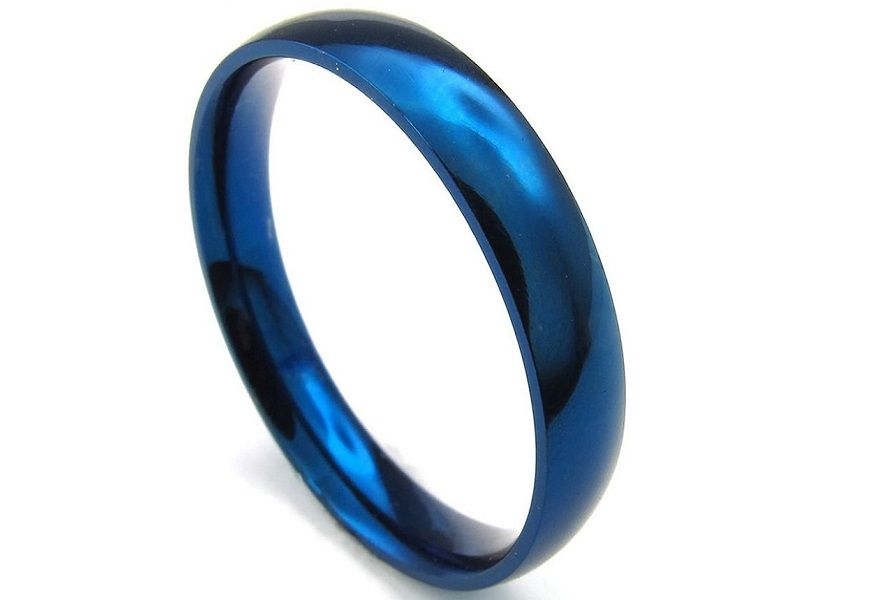
Blue Gold of the Scythians
The secret of making the unusual right was known to the ancient Scythians. But the found jewelry is an artifact that is forbidden to undergo chemical experiments.
Therefore, it was believed that blue gold was a myth, and it was simply impossible to reproduce ancient recipes.
The Argentinean jeweler Antiniassi managed to unravel the secret recipe. For a long time he did not reveal the ligature to his competitors, but was forced to do so by the demands of the international jewelry community. The secret additive turned out to be gallium.
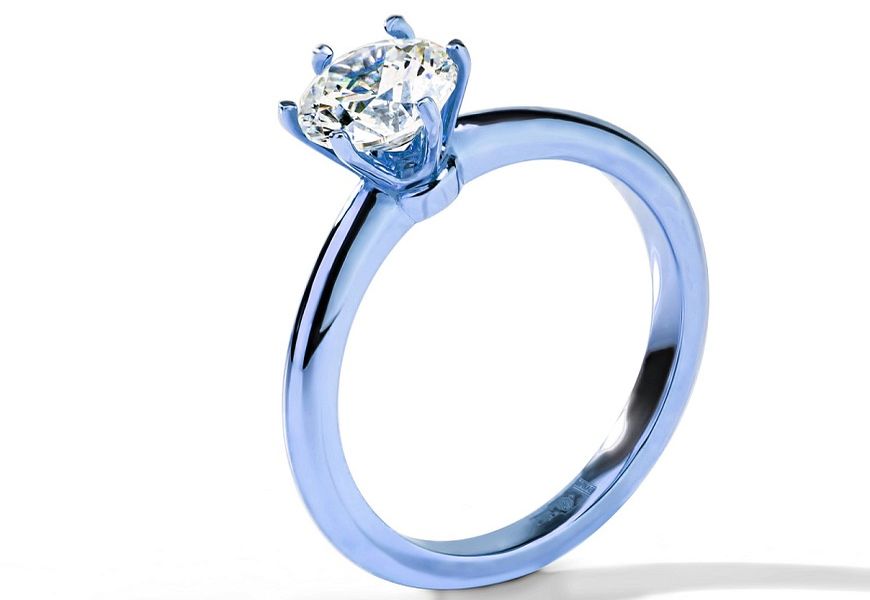
Singapore purple gold and a classified exact formula
A new type of alloy with an unusual color officially saw the light at an international exhibition (2000). Although archaeologists found similar items back in 1931 (the tomb of Tutankhamun). The first attempt to uncover the secret of the precious purple was made by Robert Wood, a physicist from the United States. He discovered that the ligature was aluminum.
But the resulting alloy was very fragile, and it was simply impossible to use it to manufacture products.
In 1999, an improved recipe was patented. Its author was Singapore scientist Lo Peng Cham. It took him almost 30 years to develop the formula he was looking for. He managed to successfully sell his invention to the jewelry company Aspial. After the deal was closed, the recipe for purple gold was classified.
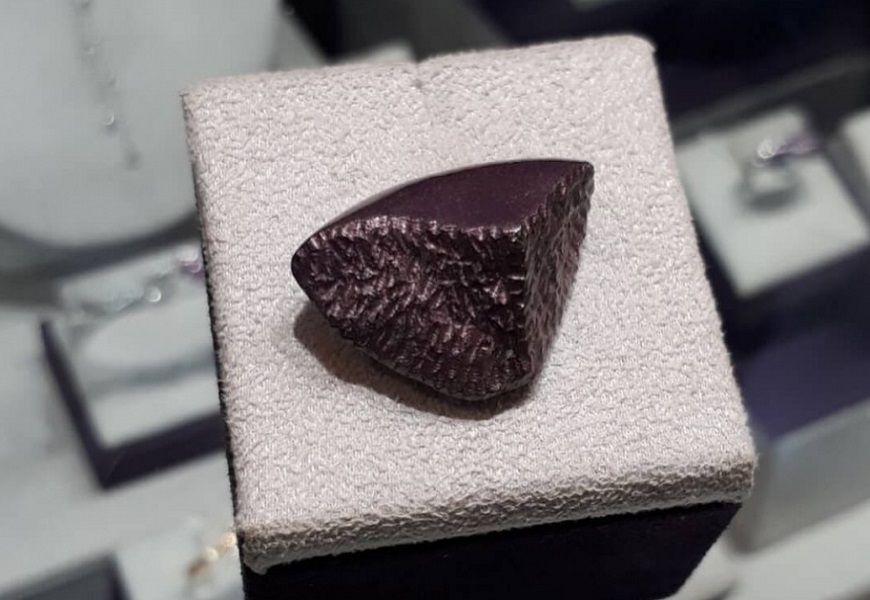
Brown gold as a result of chemical exposure
But here. shade chocolate gold It is not thanks to the ligature that it acquires, but to the help of chemistry - surface treatment. Alloys 585, 750 samples (the ligature is copper). The chemical treatment is carried out several times. The result is a protective brown film on the surface, and the product becomes more durable. The richest shades of chocolate are obtained by treatment with manganese or nickel-based mixtures.
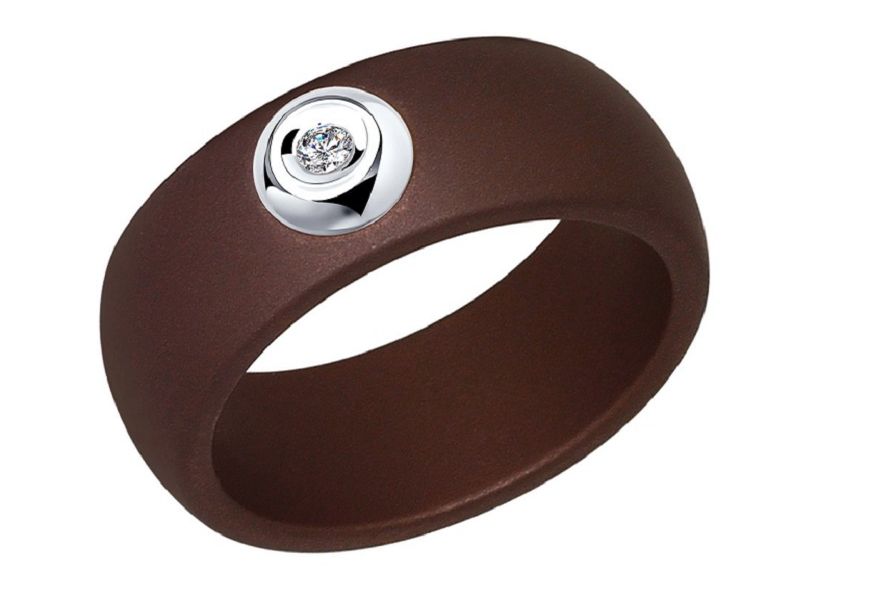
Black gold and the top 5 ways to get it
Black Gold - This is what oil is called, but the term has a literal meaning. Yes, the precious metal comes in this color. Remarkably, it can be achieved in different ways, which are no secret:
- The alloy is enriched with cobalt and chromium and then oxidized at high temperature.
- Electroplating - a precious alloy is coated with rhodium.
- Amorphous carbon treatment. This is the traditional way of preparing metal for the manufacture of wristwatch cases.
- Laser - laser surface treatment forms nanostructures with high light absorption capacity. The color is very deep.
- Treatment of the alloy surface with combinations of chemical elements to obtain a film of the desired shade.
The polished black metal surface looks like a stylish mirror. But, unfortunately, fingerprints are just as noticeable on it.
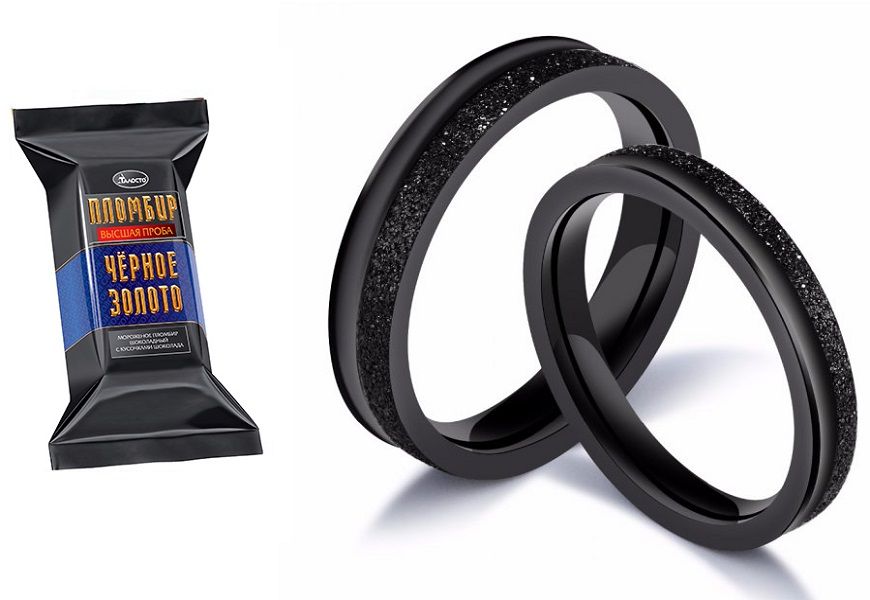
Carat and metric sampling system
The value of a precious alloy depends on its quality, which is assessed by means of a trial system. All figures do not refer to the weight or size of the piece, but to the gold-ligature relationship that exists. There are two systems currently in use:
- Carat - a number of Western countries, North America;
- metric - Russia, a number of European countries (for example, Great Britain uses it since 1973), China.
Despite their different names, both systems use the same principle for determining quality. It is based on the conventional division of an alloy into a certain number of parts. The carat system has 24 parts, while the metric system has 1,000 parts. The same figures are considered to be the benchmark and mean practically pure precious metal without any impurities.
For Russia, the metric system, which means the amount (grams) of pure metal per 1 kg of mixture, is more familiar.
24 carats (999 proof) is a naturally occurring wormwood gold, too soft and malleable. When you add ligatures, the alloy's hardness and carat will change downward.
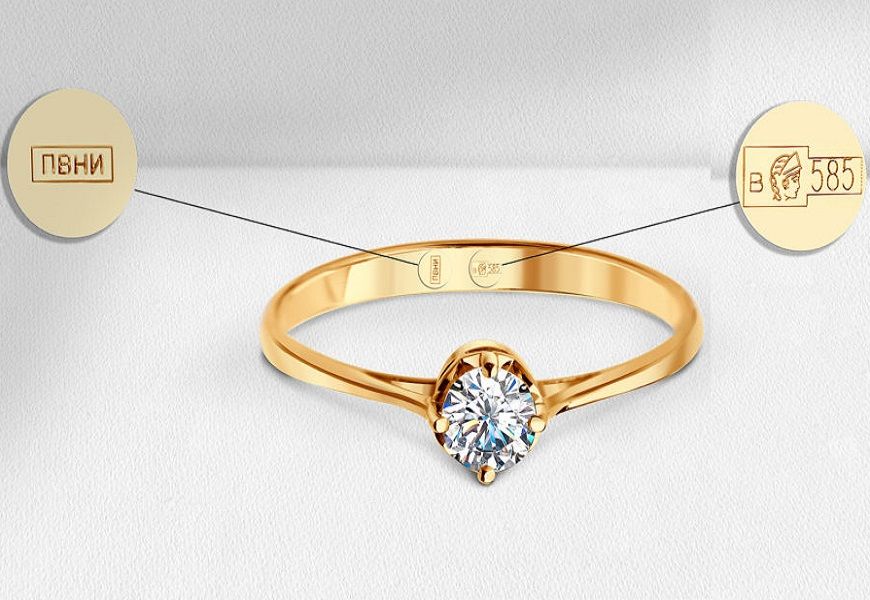
What gold markings mean
Each gold alloy has a letter marking. It stands for the name of the alloying element. For example, silver is marked as "Sb", platinum as "Pl", and copper as "M". The content fraction is marked with a digital code.
Standard gold assay in jewelry
Each ring, bracelet, chain or bar should have a sample. This guarantees quality and informs about the percentage of impurities. For example, the marking 18 carats - is 18 parts (75 %) of pure gold and 6 parts (25 %) of impurities.
In the metric system the composition with 75 % content of aurum means 750 sample.
Popular gold colors for consumers in different countries and preferences for the metal in a wide range of shades, gold types:
- Red - most popular in Russia and the post-Soviet countries;
- yellow - Europe, China;
- White - has won the hearts of fashionistas around the world, but costs too much;
- Pink - the shade is indispensable for products of the luxury segment. The top sales are in the Gulf countries;
- Green, blue, blue, amethyst and other unusual shades are popular among those who follow the fashion trends in jewelry fashion and do not spare any money;
- Black is considered a masculine metal, although it is very popular among women as well.
Video: classification of gold by color: green, purple, black and gray
Question and answer section
We have tried to collect the most common questions relating to the topic at hand, answers to them from experts in the field of jewelry.
Are there many kinds of gold used in jewelry?
What does the color of gold in jewelry depend on?
How much and what kinds of gold exist?
- coinage - made of the highest quality for the production of bullion, coins;
- banking - there is no physical medium to invest in;
- duble is a metal rolled into a thin sheet and used to make inexpensive jewelry;
- leaf leaf is about 100 nanometers thick;
- food - pure mustard with a certificate of conformity, the additive - silver;
- colloidal - a suspension of small gold particles.
There are varieties according to geographical origin.
Jeweler's comment

Customer Reviews
And I really like it when the metal is not white or yellow, but rather champagne. Products made of it are very delicate, even the largest braided chain on the neck looks elegant, expensive and stylish.


Red gold is my favorite. I thought for a long time that niello and red were the same thing. Turns out they're not. But I really like the thick shade of bronze or peach that gives gold the copper. It goes very well with dark hair and a tanned neck and arms.
A year ago it was my husband's anniversary. I decided to please him with a watch. The store offered me a watch made of precious metal. I refused, because this metal is always bright regardless of the shade, it will not suit a man (in my feminine opinion). And it turned out the gold is black! My husband is delighted.

